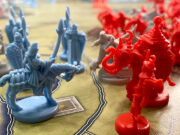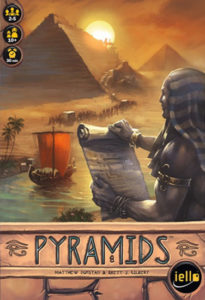 There can never be enough games about Ancient Egypt. The mystery, grandeur, and wealth of the civilization make it ample fodder for almost any game. It’s a drop-in theme for designers planning a game about building structures.
There can never be enough games about Ancient Egypt. The mystery, grandeur, and wealth of the civilization make it ample fodder for almost any game. It’s a drop-in theme for designers planning a game about building structures.
Iello’s treading back to the deserts of Egypt for Pyramids, a card drafting and set collection game for 2-5 players. It plays best with 4 or 5 players.
Gameplay Overview:
Players in Pyramids are ancient Egyptian architects. They complete structures by acquiring building cards from a center pool and then adding them to various buildings, including a mandatory pyramid.
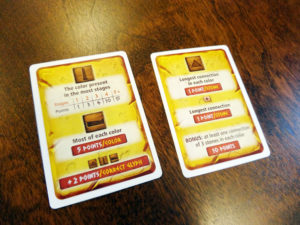
Each round of Pyramids starts with a collection of pairs of building cards laid out on the table, as well as the turn order tiles for the round. Then players go around the table selecting turn order tiles. The building cards represent the pairs of cards available for selection when it comes to a player’s building turn.
Players are aiming to complete a mandatory pyramid, or, in addition, a tomb and an obelisk. Players who select an earlier position in turn order receive fewer options when playing cards to their structures, but get a better selection of building cards, thus increasing the chance for higher points from collecting the right sets of colors.
Pyramids are scored for continuous runs of adjacent colors. Obelisks are scored for height as long as the same color exists in all levels of the obelisk. Finally, cards played face-down to a player’s tomb score points only if that player is the majority holder of the five different colors. Additional points can be made if the players play cards with icons for the tomb, obelisk, or pyramid to the appropriate location. After 10 rounds and a completed pyramid, points are tallied.
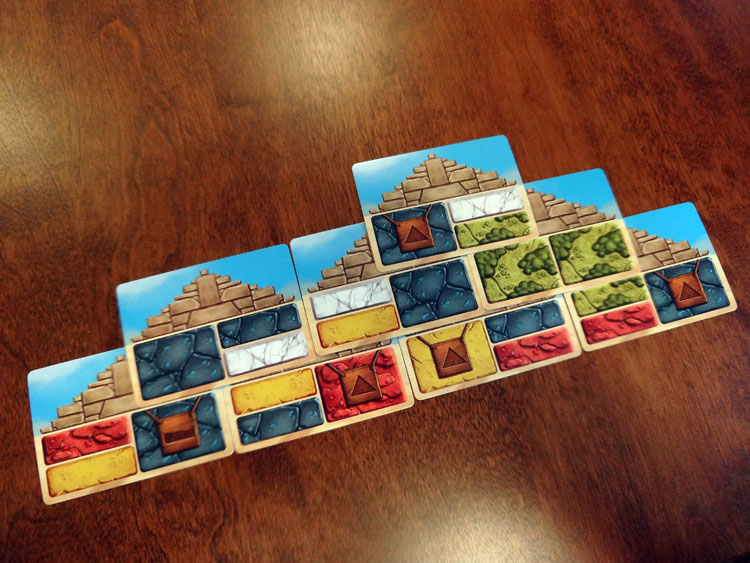
Game Experience:
This reviewer is a sucker for Egyptian themed games and Pyramids, while sporting a true veneer of a theme, does a good job at utilizing the theme as much as it can. The building cards are laid out in a thematic way and the graphic design of the cards works well for the set collection play. Even placing cards face down in a tomb feels thematically appropriate.
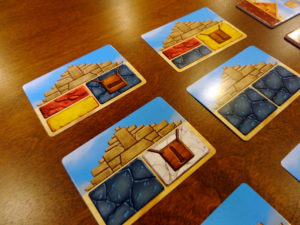
The other aspect to Pyramids that goes a long way to maintain its enjoyability is that it maintains its tension throughout. Overall points of other players are harder and harder to calculate towards the end of the game. Also, because the hidden tomb points are only revealed at the end, a cunning player can come from (seemingly) behind to win.
One weakness that was noted after a couple of plays is that turn order is exceptionally important. This is mitigated somewhat by the possibility that a player can continuously go later in the round to play more cards, but usually the set collection points favor getting just the right cards in the pyramid rather than gambling on having the most in your tomb. In addition, if any player attempts the obelisk, it’s almost mandatory to compete there as well.
Despite these negatives, a game of Pyramids stays fun. It achieves mostly what a filler game wants to be. It won’t be a hit with serious gamers, but it does take some attention to strategy to win.
Final Thoughts:
Gamers who are looking for an engaging filler with some depth, even if accompanied by some randomness and a somewhat imbalanced turn order mechanism should take a look at Pyramids. It’s a great introduction to set collection and variable turn order for new gamers while not putting experienced gamers to sleep. With the high quality from Iello, Pyramids is an easy pick for a gift game as well.
Final Score: 3.5 Stars – The play options aren’t finely tuned, but it keeps casual gamers coming back for more due to the analytical play and the competition for just the right cards.
 Hits:
Hits:
• Engaging choices
• Keeps building tense
• High depth to weight ratio
Misses:
• Turn order extremely important
• Overarching strategy depends on randomness




